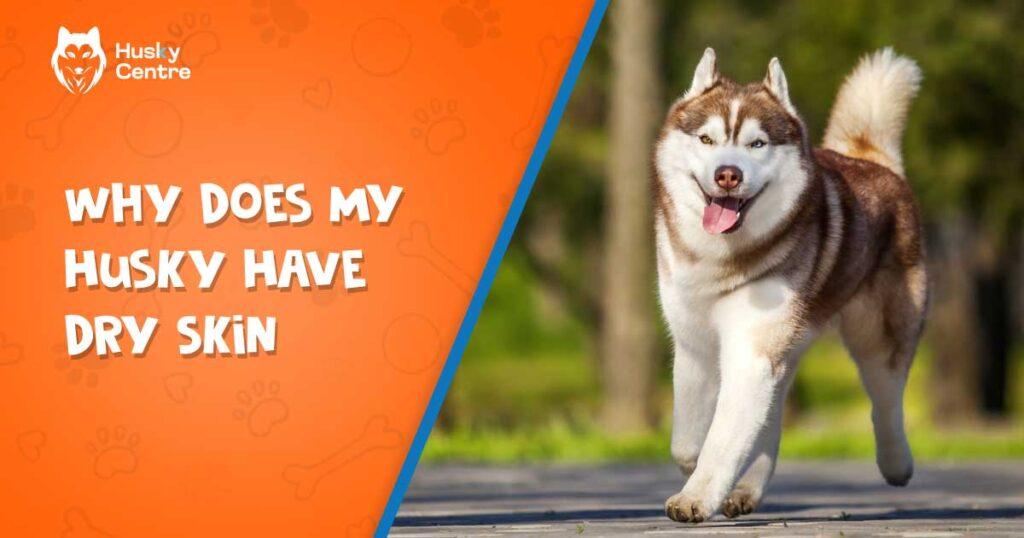Dry skin in Huskies can be caused by allergies, poor diet, or environmental factors. Regular grooming and proper nutrition help alleviate this issue.
Huskies are known for their thick, double-layered coats that protect them in cold climates. Despite this, they can suffer from dry skin, which can lead to discomfort and itching. Various factors contribute to this condition, such as allergies to certain foods or environmental elements.
A diet lacking essential fatty acids and vitamins can also result in dry skin. Regular grooming is essential in maintaining a healthy coat and skin. Ensuring your Husky has a balanced diet rich in Omega-3 and Omega-6 fatty acids can help. Always consult with a veterinarian to pinpoint the exact cause and get tailored advice for your pet.
Causes Of Dry Skin In Huskies
Huskies are known for their beautiful fur and energetic nature. But sometimes, they suffer from dry skin. Understanding the causes can help you address this issue effectively. Below, we explore the various causes of dry skin in Huskies.
Allergies
Allergies can cause dry skin in Huskies. There are different types of allergies that might affect your dog.
- Food Allergies: Certain foods can trigger allergic reactions in Huskies. Common allergens include chicken, beef, dairy, and grains.
- Environmental Allergies: Pollen, dust mites, and mold are common environmental allergens. These can cause itching, redness, and dry skin.
- Flea Allergies: Fleas can cause allergic reactions in some Huskies. Even one flea bite can lead to severe itching and dry skin.
Allergies can make your Husky uncomfortable. It is essential to identify and eliminate the allergens causing the issue. Consulting a vet can help pinpoint the exact cause and provide a suitable treatment plan.
Low Humidity And Cold Weather
Huskies are originally from cold climates. While they are built for snowy conditions, low humidity and cold weather can still affect their skin.
Low Humidity: Dry air can strip the skin of its natural oils, leading to dryness. This is common in winter when indoor heating systems are in use.
Cold Weather: Cold air lacks moisture, which can result in dry, flaky skin. Outdoor exposure during chilly months can exacerbate this issue.
| Condition | Effect on Skin |
| Low Humidity | Removes natural oils |
| Cold Weather | Causes dry, flaky skin |
Maintaining proper humidity levels inside your home can help prevent dry skin. Using a humidifier can add moisture to the air, keeping your Husky’s skin hydrated.
Nutritional Deficiencies
Proper nutrition is crucial for your Husky’s overall health. Nutritional deficiencies can lead to various skin problems, including dryness.
Essential Fatty Acids: Omega-3 and Omega-6 fatty acids are vital for healthy skin. Lack of these can result in dry, flaky skin.
Vitamins and Minerals: Vitamins like A and E, along with minerals like zinc, are essential for skin health. Deficiency in these nutrients can cause dryness and other skin issues.
| Nutrient | Role in Skin Health |
| Omega-3 & Omega-6 | Keep skin hydrated |
| Vitamins A & E | Promote skin health |
| Zinc | Supports skin function |
Ensuring a balanced diet with all essential nutrients is key. High-quality dog food or supplements can help maintain your Husky’s skin health, keeping it hydrated and free from dryness.
Health Conditions Leading To Dry Skin
Is your husky suffering from dry skin? Various health conditions can lead to this issue. Understanding these conditions can help you address the problem effectively. Let’s explore the common health conditions that cause dry skin in huskies.
Hypothyroidism In Huskies
Hypothyroidism is a common cause of dry skin in huskies. This condition occurs when the thyroid gland doesn’t produce enough hormones. These hormones regulate your dog’s metabolism.
Common symptoms of hypothyroidism include:
- Dry, flaky skin
- Weight gain
- Lethargy
- Hair loss
Hypothyroidism makes it hard for your husky to maintain healthy skin and coat. The underactive thyroid slows down skin regeneration. This leads to dryness and flakiness.
Diagnosis involves a blood test to check hormone levels. Treatment typically includes thyroid hormone replacement therapy. This therapy can improve your dog’s skin condition.
It’s crucial to monitor your husky’s skin and overall health. Regular vet visits can help catch hypothyroidism early. Early treatment can prevent severe skin problems.
Hypothyroidism can be managed with proper care. Your vet may also recommend a special diet. This diet supports skin health and overall well-being.
Seborrhea And Other Skin Disorders
Seborrhea is another condition that leads to dry skin in huskies. Seborrhea affects the sebaceous glands, which produce skin oils. There are two types of seborrhea: seborrhea sicca (dry) and seborrhea oleosa (oily).
Symptoms of seborrhea include:
- Scaly, flaky skin
- Red, irritated patches
- Greasy or waxy coat
Other skin disorders causing dry skin include:
- Allergies
- Fungal infections
- Parasites
Allergies can cause itchy, dry skin. Common allergens include pollen, food, and dust mites. Fungal infections, like ringworm, can also dry out your husky’s skin. Parasites, such as mites, lead to skin irritation and dryness.
Treatment for seborrhea and other skin disorders varies. Anti-seborrheic shampoos can help manage seborrhea. Allergies may require antihistamines or a change in diet. Fungal infections need antifungal medications. Parasite infestations require appropriate treatments.
Regular grooming can also help maintain healthy skin. Brush your husky’s coat to remove dead skin cells and distribute natural oils. Keep your husky’s environment clean to reduce allergen exposure.
Consult your vet for proper diagnosis and treatment. Managing these skin disorders can improve your husky’s skin health and comfort.
Environmental Factors Affecting Skin
Huskies are known for their thick, beautiful coats, but sometimes they can suffer from dry skin. One common cause of dry skin in huskies is environmental factors. Understanding these can help keep your pet’s skin healthy and comfortable.
Bathing Frequency And Shampoo Types
Bathing your husky too often can strip their skin of natural oils, leading to dryness. Huskies generally need a bath only once every few months. Use a shampoo specifically designed for dogs. Human shampoos can be too harsh and cause further dryness.
Here are some tips for bathing your husky:
- Bathe them every 3-4 months.
- Use lukewarm water to avoid drying out the skin.
- Choose a moisturizing dog shampoo.
- Rinse thoroughly to remove all shampoo residue.
Consider using a conditioner. It can help lock in moisture and keep the coat shiny.
If your husky has sensitive skin, look for hypoallergenic shampoos. These are gentler and less likely to cause irritation.
Effects Of Indoor Heating And Air Conditioning
Indoor heating and air conditioning can dry out the air in your home. This can lead to dry skin for your husky. Use a humidifier to add moisture to the air. Place it in areas where your husky spends the most time.
Here are some tips for managing indoor air:
- Use a humidifier during the winter months.
- Keep the humidity level between 30-50%.
- Avoid placing your husky’s bed near heating vents.
- Open windows occasionally to let in fresh air.
Monitor your husky for signs of dry skin. These include flakiness, itching, and redness. If you notice these signs, adjust the indoor environment accordingly.
Consider using an air purifier. It can help remove dust and allergens that might irritate your husky’s skin.
Treatment And Prevention Of Dry Skin
Huskies are known for their thick, beautiful coats, but dry skin can be a common issue. Understanding the causes is crucial, but even more important is knowing how to treat and prevent it. Below, we explore effective methods for alleviating and preventing dry skin in Huskies.
Using Moisturizing Shampoos And Conditioners
One of the most effective treatments for dry skin in Huskies is using the right moisturizing shampoos and conditioners. These products are specially formulated to add moisture to your dog’s skin and coat.
Look for shampoos that contain natural ingredients such as:
- Aloe Vera
- Oatmeal
- Coconut Oil
These ingredients help to soothe the skin, reduce itching, and add essential oils back into the coat. It’s important to avoid shampoos that contain harsh chemicals or artificial fragrances, as these can exacerbate dry skin.
Bathing Frequency is also key. Over-bathing can strip the skin of its natural oils, leading to dryness. Aim to bathe your Husky every 4-6 weeks, unless otherwise directed by a vet.
| Shampoo Ingredient | Benefits |
| Aloe Vera | Soothes and moisturizes the skin |
| Oatmeal | Reduces itching and inflammation |
| Coconut Oil | Provides essential fatty acids |
Adjusting Diet To Support Skin Health
Diet plays a significant role in the health of your Husky’s skin. A well-balanced diet can prevent dry skin and other related issues.
Ensure your Husky’s diet includes:
- Omega-3 and Omega-6 Fatty Acids – Found in fish oil and flaxseed, these fats promote healthy skin and a shiny coat.
- High-Quality Protein – Essential for overall health and skin regeneration.
- Antioxidants – Found in fruits and vegetables, they help to reduce inflammation and support the immune system.
Consider adding supplements to your Husky’s diet. Omega-3 and Omega-6 supplements can be particularly beneficial. Always consult your veterinarian before making any significant dietary changes.
Hydration is also crucial. Ensure your Husky has access to fresh water at all times. Proper hydration helps maintain skin elasticity and moisture.
Consulting A Veterinarian For Severe Cases
If your Husky’s dry skin persists or worsens despite home treatments, consulting a veterinarian is essential. A vet can diagnose underlying conditions that may be causing the dry skin.
Some common underlying conditions include:
- Allergies – Food or environmental allergies can lead to chronic dry skin.
- Parasites – Mites or fleas can cause severe itching and dry patches.
- Hormonal Imbalances – Conditions like hypothyroidism can affect skin health.
Your vet may perform diagnostic tests to identify the root cause. Treatment may include medications, special diets, or other therapies tailored to your Husky’s specific needs.
Regular Check-Ups with your vet can help catch and address skin issues early, preventing more severe problems down the line.
Frequently Asked Questions
Why Does My Husky Have Flaky Skin?
Flaky skin in huskies can be due to dry air, allergies, or poor diet. Regular grooming and moisturizing can help.
How Can I Treat My Husky’s Dry Skin?
To treat dry skin, ensure your husky has a balanced diet, proper hydration, and use dog-friendly moisturizers. Consult a vet if needed.
Is Dry Skin Common In Huskies?
Yes, dry skin is common in huskies. Their thick fur can sometimes mask underlying skin issues, making regular checks important.
What Foods Help Improve Husky Skin Health?
Foods rich in omega-3 fatty acids, like fish oil and flaxseed, help improve husky skin health. Consult your vet for dietary advice.
Conclusion
Ensuring your Husky’s skin stays healthy is essential for their overall well-being. Regular grooming, a balanced diet, and hydration are key. Consult your vet for persistent issues. By taking these steps, you can help your Husky maintain a healthy, happy life.
Keep an eye on their skin to catch problems early.


Meet Jarred, the heart and soul behind HukyCentre. With a deep affection for furry friends, he pours his passion into every word he writes. His genuine love for dogs shines through in his engaging and informative content. As a dedicated dog enthusiast, Jarred’s goal is to share valuable insights and tips that resonate with fellow dog lovers. Join Jarred on the journey as he celebrates the joy and companionship that dogs bring into our lives.



